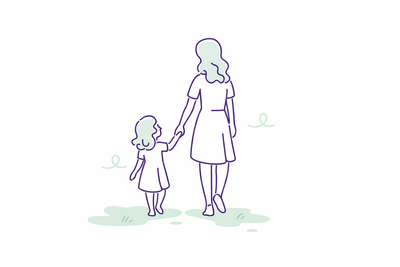
I half wrote this post LONG time ago, over 8 months ago, but it never seemed the right time to publish. I’m not more ready now, I’m still on a rollercoaster of emotions, and I still don’t see the light at the end of this sleep deprivation tunnel, but I’m stronger and more confident. So I decided to finish it, and here it goes. There’s no real advice this time, no trick, no solution, and probably it’s not even coherent. Just a mom opening up.
I haven’t slept more than two uninterrupted hours for 18 months. The first 12 months, though, despite feeling a great amount of inexplicable sadness, frustration, and rage, I rarely cried. When I felt like crying, I’d swallow my tears, rationalise (how could I possibly be unhappy with two healthy and amazing kids?) and build walls around me. Eventually, the sadness would go away and I’d feel strong again.
Until the next time. When I’d have to deal with all the accumulated sadness, and I’d suppress it again. And again. And again. For a long time.
I became my own Pandora’s box.
Somewhere along the way—and sometimes fed up with unsolicited advice—I decided to stop boring my friends and family with my problems. I’d avoid social gatherings, or I’d put on a smile and zombie my way through some friendly conversations.
I didn’t feel happy, and I started taking it out on the one person who was in it with me, Alex.
I started complaining.
About everything. About him not contributing enough in the house. About him not contributing the right way in the house. About a laundry he did wrong. About that trash bag that sat in the kitchen for days. About using the wrong towel to dry the kids after the bath. About not making rice with HIS homemade chicken curry that the kids won’t like. And so on.
I could rationally appreciate all his contribution, but I could’t help but seeing all the faults. All the time.
My husband is the most optimistic, positive and patient person I know, but little by little, complaint after complaint, I was breaking him. His positivity started fading. He started snapping at me, being impatient and intolerant when dealing with my complaints and moods. He had zero empathy towards me—the one thing I desperately needed.
It affected everything in our relationship—our caring for each other, our complicity, our friendship, our communication, our showing affection, our already flailing sex life. The more we tried to fix it, to talk it out, the more we grew apart. We didn’t speak the same language anymore. Every argument ended in one or both of us agreeing to disagree, walking away, or going to bed angry: we patched it up in the morning, another apology and we were all good to go.
Except I wasn’t. I was just suppressing more, swallowing more sadness.
Several nights I found myself up late googling “postpartum depression symptoms”—could my mood really be caused just by lack of sleep? I started scanning forums to find answers to questions like “how do you know when your marriage is over?”, “why am I not happy with my perfect life?”. I was drowning inside, it was the darkest stretch of the tunnel.
Then one night…
several months ago, after yet another argument with Alex, in which we jumped from one subject to another, pointing fingers and verbally hurting each other, he told me—tears in his eyes—four words that I’ll never forget.
I miss my wife.
As I sat there, tears just started pouring down my cheeks and all I could genuinely say was, I MISS ME TOO. In that moment I realised how much I had changed, and how much I missed the old (real?) me—and our team even more. I sobbed on his shoulder for what felt like an eternity, and we held each other tight like we hadn’t done in a long time.
That night I realised two things:
- I wasn’t the only one hurting. Alex was also struggling. For different reasons and showing it in different ways, but he was also sad. Seeing each other vulnerable made us feel close again after a long time. Too often, we want to hide our being vulnerable, but we forget that vulnerability is not weakness. It’s strength. It shows that you’re in tune with yourself, and it’s a powerful tool to connect with others.
- Sleep deprivation is out of my control, but my reaction to it is my own choice. I could either keep complaining and feeling sad for myself, blaming Emily’s not sleeping, Oliver’s acting up, my not having time for myself or my job, Alex’s not being empathetic. Or I could call up the warrior in me, and beat the shit out of sleep deprivation (pardon my French).We often blame our sadness, rage, and frustration on external factors, and for a reason: often what happens in life is not under our control. But the way we react to it is our own choice—and we always do have a choice.
That night didn’t change much in our situation. Despite some recent progress, Emily’s still not sleeping well. Alex and I worked hard and made some major improvements in our relationship, but we still get sidetracked often—sometimes even just a sentence can send us back into the dark woods for days. As for me, not sleeping still affects my mood enormously, I still complain (but less, and more consciously) and I’m still in precarious balance between sanity, depression, and madness (but after all, isn’t that the natural state of motherhood?).
But that night something did change. Somehow, Alex’s words spoke straight to the warrior in me, and released that anchor that was holding me down.
Since then, I stopped finding excuses, feeling sorry for myself, and I started living fully again—writing, working, being productive, dancing, eating healthier, giving myself challenges to become a better version of myself. Today I’m stronger, more focused, more confident. I feel vulnerable at all time, but invincible at the same time. I feel I’ve become my own woman in a way I’ve never been before.
And above all, I’m not suppressing anymore—if anything, I’m letting it all out the way it comes, good or bad, and guilt-free: one day I stopped the car, and yelled “aaaaaaaaaaahhhhhhhhh” at my mom in front of the kids because I just couldn’t stand arguing with her anymore; another day I cried like a baby because my friend had really good news; a few days ago I sobbed for half an hour listening to “Lost Stars” over and over again. The list goes on, emotions flow wild.
Ironically though, I feel more in control of my emotions now than I’ve ever felt before: it’s almost as if by knowing that I can allow myself to let my emotions run wild I feel more mentally and emotionally stable (a bit like when I decide not to eat sweets and all I think of is cake and cookies, but if I decide that I can have sweets whenever I want, I actually don’t mind turning them down. Does this even make sense?).
So maybe this IS the end of a tunnel, not the sleep deprivation tunnel, but a different, unexpected one of personal growth and resilience. And maybe it’s true what they say, that at the end of any tunnel there’s always a stronger, more resilient version of yourself… you just need to grow some balls and make your way out.
































